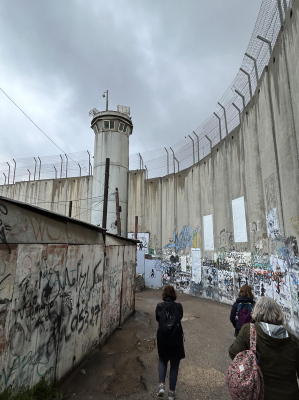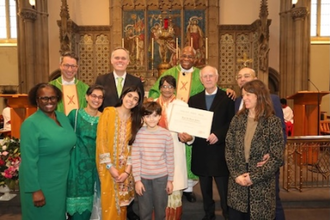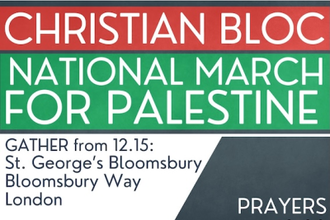Priest describes life in West Bank after Gaza ceasefire

Wall surrounding Bethlehem. ICN/JS
Source: CAFOD
Two weeks after the long-awaited ceasefire agreement between Israel and Hamas, there is hope - although the situation remains very fragile. CAFOD was honoured to welcome partners from Caritas Jerusalem to London last week and reflected with them on the realities on the ground, the fears that remain, and what must change.
Elizabeth Funnell, CAFOD's Middle East Country Representative said: "The ceasefire is a good first step but alone it's not enough to bring a just and sustainable peace. Any plans must go far beyond humanitarian aid and seek to deal with the root causes of poverty and lack of rights for Palestinians - whether in the West Bank (including East Jerusalem) or in Gaza."
There is often silence about the situation in the West Bank but Palestinians there are deeply fearful that the situation there will continue to deteriorate in the coming weeks and months.
Fears for the West Bank
Since October 7th, 2023, there have been large scale military operations in the north of the West Bank, as well as sweeping access and movement restrictions that limit people's lives and livelihoods. Settler violence has increased exponentially.
A Palestinian priest who lives in the West Bank, near Jenin, described the impact of the Israeli occupation on his daily life and on the hopes and fears for Palestinians in these early days.
"We see that in the past, whenever they stopped in Gaza, they were more aggressive in the West Bank. So this is the fear."
"They asked me to take off all my clothes in the street"
Already, a journey that used to take 90 mins can take an entire day, as multiple new checkpoints are introduced. The Father shared that he and other Palestinians are regularly stopped and interrogated on their travels. Often at gunpoint.
"They are very firm… they stopped me once, [for] seven hours. They asked me to take off all my clothes in the street. I showed them my priesthood card and I showed them that I have VIP (permit) from Israel. It doesn't matter. It is humiliating, and the people cannot always take it… they are human beings, they have feelings."
And yet the priest, who's been serving for more than two decades, still has hope. He said: "We have to… teach the people how to live together… in peace, not in hatred. We have to change the language, to change the hearts. This is the hope."
CAFOD's vision is of a future where all people in the region can flourish. But without justice there can be no lasting peace. In line with the ICJ opinion of July 2024, Israel's unlawful occupation of Palestinian territory, fuelled by settlement expansion, must end and states must not offer any material assistance to the occupation.
LINKS
CAFOD: www.cafod.org.uk
CAFOD Gaza ceasefire report: https://cafod.org.uk/news/emergencies-news/gaza-ceasefire


















